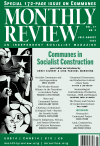
July-August 2025 (Volume 77, Number 3)
This month’s “Notes from the Editors” discusses the accelerating progress of China toward sustainability. China’s decline in carbon emissions and rapidly decarbonizing energy sector demonstrates the importance of societal realignment and extensive planning to shift toward the ecological modernization that has continued to elude monopoly-capitalist regimes. | more…

A Special Issue on Communes in Socialist Construction
Inspired by the Venezuelan project of building socialism via the commune, this special issue looks at attempts to use communal models in socialist projects in a range of different contexts, as well as the theoretical bases for such an endeavor. In their introduction, guest editors Chris Gilbert and Cira Pascual argue that the theme of Communes in Socialist Construction is an important opportunity for engaged Marxist reflection of a kind that offers valuable contributions to the universal body of socialist thought. | more…

Venezuela’s Communal Project
Ángel Prado, a founder of El Maizal Commune and Minister of Communes since 2024, discusses Venezuela’s communal project as both a response to urgent material needs and a long-term strategy for building socialism. Drawing on his experience as a grassroots organizer, he explores how communes are structured, how they relate to the state, and how they embody a vision of popular power. He also reflects on the need for unity within the Chavista movement. | more…

Socialist Communes and Anti-Imperialism: The Marxist Approach
Chris Gilbert proposes to answer the question: When is a socialist commune anti-imperialist? His response follows Karl Marx’s line of thought, looking at the latter’s approach to the commune from the Grundrisse through his late notes and letters on rural communes. After reconstructing the Marxist communal strategy, Gilbert argues that real-world projects in Venezuela, Bolivia, and Brazil in recent times conform to this overall Marxist approach, combining communal construction with an anti-imperialist drive for national liberation. | more…

The Worker-Peasant Alliance in the Transition to Socialism Today
Prabhat and Utsa Patnaik consider the historical views of the relationship between the proletariat and peasantry during the revolutionary transition to socialism and struggle against imperialism. While other thinkers have suggested that alliances between the two groups must be shed in order to complete the revolution, the Patnaiks propose a framework of voluntary cooperatization benefiting all. | more…

Marx and Communal Society
In this innovative study, John Bellamy Foster gets to the heart of Marx’s writing on communal societies—an aspect of Marx’s work that is often overlooked, despite its importance to the socialist project. Tying together Marx’s studies of anthropology, history, and ethnology, Foster illuminates the centrality of communalism to Marx’s overall critique of class-based societies. | more…

Charting a Communal-Ecological Path: Beyond the Growth Fetish
Brian M. Napoletano revisits the concept of generalized autogestion, traditionally defined broadly as “self-management,” placing it in the context of an ecological path to socialism. Using this orientation, Napoletano leads to reader to consider the potential of socioecological approaches to repairing the metabolic rift and pursuing sustainable human development. | more…

Land, Cooperation, and Socialism
João Pedro Stedile, founder and spokesperson of Brazil’s Landless Workers’ Movement (MST), reflects on the movement’s efforts to build a socialist alternative through land occupations, cooperative production, and political education. He highlights the importance of collective struggle and the MST’s deepening ties with Venezuela’s communal movement as part of a broader project to construct a just and solidarious society. | more…

Popular Power in Brazil: What Can We Learn from Indigenous, African, and Peasant Histories of Collective Resistance?
“To tell the history of resistance,” Roberta Traspadini writes, “we need to investigate the territories where people live their daily lives.” Using both historical analysis and contemporary data, Roberta Traspadini reveals the importance of Brazilian Quilombola communities as local sites of struggle against colonialism, capitalism, and imperialism. These quilombagem, she argues, reveal the revolutionary legacy that persists among the most marginalized in Brazilian society. | more…

Socioecological Contradictions in the Development of Socialist Collective Farming: Drawing from USSR and Hungarian Histories
Through a detailed exploration of the impacts of collective farming on local soils, Salvatore Engel-Di Mauro engages in key questions around the past and present of communal agricultural production. These insights shed light on not only specific projects, but future considerations for communal farming, framed by the dialectical relationship of nature and society. | more…

Making Every Yard a Farm and Every Garage a Factory: The Theory and Practice of Cooperation Jackson
Kali Akuno of Cooperation Jackson outlines the ongoing projects and objectives of the Mississippi-based collective Cooperation Jackson. Akuno enumerates the many ways Cooperation Jackson has worked toward improving material conditions and building dual power in support of the Black working and peasant classes in the Mississippi Delta region. | more…

Communal Governance and Production in Rural China Today
Sit Tsui and Lau Kin Chi elucidate the history of China’s People’s Communes as told through the lens of three present-day rural villages. In these villages, they observe the effects of the project’s dismantling and diminishing collective ownership and land management, with the conclusion that a return to collectivism is vital for carrying forward the socialist project. | more…

Inside a People’s Commune: Report from Chiliying (Excerpt)
Inside a People’s Commune is a short 1974 book documenting life in the Chiliying Commune, one of the earliest in revolutionary China. The text explores the commune’s organization, challenges, achievements, and mass-based character. Hugo Chávez later drew inspiration from the book, citing it when launching Venezuela’s communal project. Today, it continues to serve as a pedagogical tool for Venezuelan communards working to build a unified system of socialist self-government. | more…